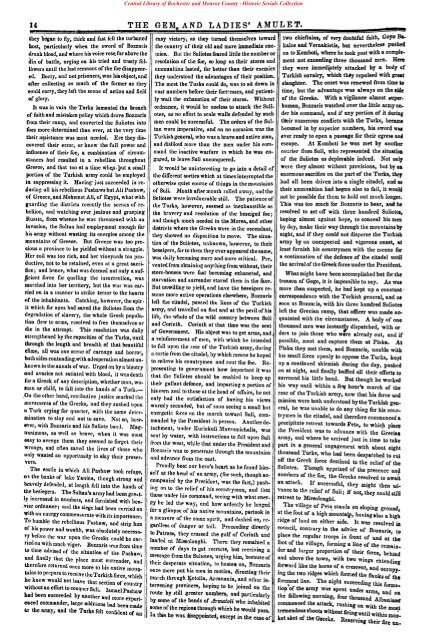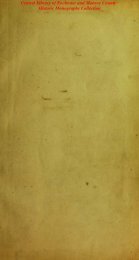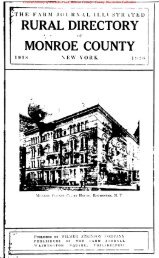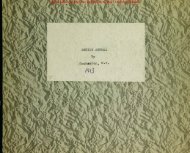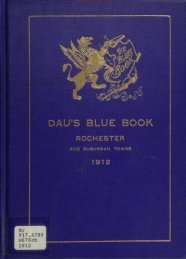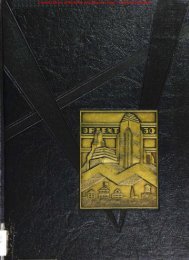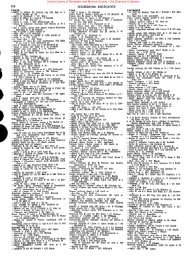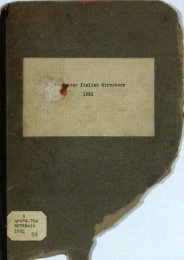LADIES' AMULET. - Monroe County Library System
LADIES' AMULET. - Monroe County Library System
LADIES' AMULET. - Monroe County Library System
Create successful ePaper yourself
Turn your PDF publications into a flip-book with our unique Google optimized e-Paper software.
14 THE GEM.AND LADIES 1<br />
they began to fly, thick and fast fell the turbane<br />
host, particularly when the sword of Bozzari<br />
drank blood, and where his voice rose, far above tin<br />
din of battle, urging on his tried and trusty fol<br />
lowers until the last remnant of the foe disappear<br />
ed. Sooty, and not prisoners, was his object, an<br />
after collecting as much of the former as the)<br />
could carry, they left the scene of action and fiel<br />
of glory.<br />
It was in vain the Turks lamented the breach<br />
of faith and mistaken policy which drove Bozzaris<br />
from their camp, and converted the Suliotes into<br />
fees more determined than ever, at the very time<br />
their assistance was most needed. Ere they discovered<br />
their error, or knew the full power and<br />
influence of their foe, a combination of circumstances<br />
had resulted in a rebellion throughout<br />
Greece, and that too at a time wluyi. but a small<br />
portion of the Turkish army could be employed<br />
in suppressing it. Having 1 just succeeded in reducing<br />
all his rebellious Pashaws but Ali Pashaw,<br />
of Greece, and Mehemet Ali, of Egypt, what with<br />
guarding the districts recently the scenes of rebellion,<br />
nnd watching ever jealous and grasping<br />
Russia, from whence he was threatened with an<br />
invasion, the Sultan had employment enough for<br />
his army without wasting its energies among the<br />
mountains of Greece. But Greece was too precious<br />
a province to be yielded without a struggle.<br />
Her soil was too rich, and her vineyards too productive,<br />
not to be retained, even at a great sacrifice<br />
; and hence, what was deemed not only a sufficient<br />
force for quelling the insurrection, was<br />
marched into her territory, but the war was carried<br />
on in a manner to strike terror to the hearts<br />
of the inhabitants. Catching, however, the spirit<br />
which for ages had saved the Suliotes from the<br />
degradation of slavery, the whole Greek population<br />
flew to arms, resolved to free themselves or<br />
die in the attempt. This resolution was daily<br />
strengthened by the rapacities of the Turks, until<br />
through the length and breadth of that beautiful<br />
clime, all was one scene of carnage and horror,<br />
both sides contending.with adesperation almost unknown<br />
in the annals of war. Urged on by a bigotry<br />
and avarice not satiated with blood, it was death<br />
for a Greek of any description, whether mnn, woman<br />
or child, to fall into the hands of a Turk.-r-<br />
(On the other hand, retributive justice marked the<br />
movements oC the Greeks, and they rushed upon<br />
a Turk crying for quarter, with the same determination<br />
to slay and not to save. Not so, however,<br />
with Bozzaris and his Suliote band. Magnanimous,<br />
as well as brave, when it was most<br />
easy to avenge them they seemed to forget their<br />
wrongs, and often saved the lives of those who<br />
only wanted an opportunity to slay their preservers.<br />
The eastle in which AH Pashaw took refuge,<br />
01 the banks of lake Yanina, though strong and<br />
bravely defended, at length fell into the hands of<br />
the besiegers. The Sultan's army had been gre.tly<br />
increased in numbers, and furnished with hea-<br />
•vier ordnance; and the siege had been carried on<br />
With an eaergy commensurate with its importance.<br />
To humble the rebellious Pashaw, and strip him<br />
of his power and wealth, was absolutely necessary<br />
before the war upon the Greeks could be earned<br />
on with much vigor. Bozzaris was from time<br />
to time advised of the situation of the Pashaw,<br />
and finally that the place must eurrender, and<br />
therefore returned once more to his native inou0tains<br />
to prepare to receive the Turkish force, which<br />
he knew would not leave lhat section of cou<br />
withoutanefforttoconqucrSuli. IsmaelPashaw<br />
had been succeeded by another and more experienced<br />
commander, large additions had been made<br />
to the army, and the Turks felt confident of an<br />
Central <strong>Library</strong> of Rochester and <strong>Monroe</strong> <strong>County</strong> · Historic Serials Collection<br />
easy victory, as they turned themselves toward<br />
the country of their old and more immediate enemies.<br />
. But the Suliotes feared little the number or<br />
resolution of the foe, so long as their stores and<br />
ammunition lasted, for better than their enemies<br />
they understood the advantages of their position.<br />
The most the Turks could do, was to sit down in<br />
vast numbers before their fortresses, and patiently<br />
wait the exhaustion of their stores. Without<br />
ordnance, it would be useless to attack the Suliotes,<br />
as no effort to scale walls defended by such<br />
men could be successful. The orders of the Sultan<br />
were imperative, and on no occasion was the<br />
Turkish general, who was a brave and active man,<br />
and disliked more than the men under his command<br />
the inactive warfare in which he was engaped,<br />
to leave Suli unconquercd.<br />
It would be uninteresting to go into a detail of<br />
the different sorties which at times interrupted the<br />
otherwise quiet course of things in the mountains<br />
of Suli. Month after month rolled away, and the<br />
Suliotes were invulnerable still. The patience of<br />
the Turks, however, seemed as inexhaustible as<br />
the bravery and resolution of the beseiged foe;<br />
and though much needed in the Morea, and other<br />
districts where the Greeks were in the ascendant,<br />
they showed no disposition to move. The situation<br />
of the Suliotes, unknown, however, to their<br />
beseigers, for to them they ever appeared the same,<br />
was daily becoming more and more critical. Prevented<br />
from obtaining anything from without, their<br />
store-houses were fast becoming exhausted, and<br />
starvation and surrender stared them in the face.<br />
But unwilling to yield, and have the beseigers resume<br />
more active operations elsewhere, Bozzaris<br />
left the citadel, passed the lines of the Turkish<br />
army, and travelled on foot and at the peril of his<br />
life, the whole of the wild country between Suli<br />
and Corinth. Corinth at that time was the seat<br />
of Government. His object was to get arms, and<br />
a reinforcement of men, with which he intended<br />
to full upon the rear of the Turkish army, during<br />
sortie from the citadel, by which means he hoped<br />
to relieve his countrymen and rout the foe. Representing<br />
to government how important it was<br />
that the Suliotes should be enabled to keep up<br />
their gallant defence, and imparting a portion of<br />
his own zeal to those at the head of affairs, he not<br />
inly had the satisfaction of having his views<br />
warmly seconded, but of soon seeing a small but<br />
energetic force on the march toward Suli, commended<br />
by the President in person. Anotherdetachment,<br />
under Kuriekuli Mavromichalis, was<br />
sent by water, with instructions to fall upon Suli<br />
from the west, while that under the President and<br />
Bozzaris was to penetrate through the mountains<br />
and advance from the east.<br />
Proudly beat our hero's heart as he found himiclf<br />
at the head of an army, (for such, though nc-<br />
:ompanied by the President, was the fact,) pushng<br />
on to the relief of his countrymen, and that<br />
hose under his command, seeing with what cneriy<br />
he led the way, and how ardently he longed<br />
br a glimpse of his native mountains, partook in<br />
measure of the same spirit, and dashed on, re-<br />
?ardlcss of danger or toil. Proceeding directly<br />
to Patrass, they crossed the gulf of Corinth and<br />
landed at Missolonghi. There they remained a<br />
number of days to get recruits, but receiving a<br />
message from the Suliotes, urging him, because of<br />
their desperate situation, to hasten on, Bozzaris<br />
once more put his men in motion, directing their<br />
march through Ketolia, Arcanania, and other intervening<br />
provinces, hoping to be joined on the<br />
route by still greater numbers, and particularly<br />
by some of the bands of drmatoli who inhabited<br />
some of the regiong through which he would pass,<br />
to this he was disappointed, except in the case of<br />
two chieftains, of very doubtful faith, GoyoBakalos<br />
and Vernakiotis, bat nevertheless poshed<br />
on to Komboti, where he took post with a complement<br />
not exceeding three thousand men. Here<br />
they were immediately attacked by a body cf<br />
Turkish cavalry, which they repulsed with great<br />
slaughter. The onset was renewed from time to<br />
time, but the advantage was always on the side<br />
of the Greeks. With a vigilance almost superhuman,<br />
Bozzaris watched over the little aimy under<br />
his command, and if any portion of it during<br />
tlteir numerous conflicts with the Turks, became<br />
hemmed in by superior numbers, his sword war<br />
ever ready to open a passage for their egress ana*<br />
escape. At Komboti he was met by another<br />
courier from Suli, who represented the situation<br />
of the Suliotes as deplorable indeed. Not only<br />
were they almost without provisions, but by ao<br />
enormous sacrifice on the part of the Turks, they<br />
had all been driven into a single citadel, and as<br />
their ammunition had began also to fail, it would<br />
not be possible for them to held out much longer.<br />
This was too much for Bozznris to bear, and he<br />
resolved to set off with three hundred Suliotet,<br />
hoping almost against hope, to conceal his men<br />
by day, make their way through the mountains by<br />
night, and if they could not disperse the Turkish<br />
army by an unexpected and vigorous onset, at<br />
least furnish his countrymen with the means for<br />
a continuation of the defence of Che citadel until<br />
the arrival of the Greek force under the President.<br />
What might have been accomplished but for the<br />
treason of Gogo, it is impossible to say. As was<br />
more than suspected, he had kept up a constant •<br />
correspondence with the Turkish general, and ag<br />
soon as Bozzaus, with his three hundred Siiliotes<br />
left the Grecian camp, that officer was made acquainted<br />
with the cirenmstance. A body of one<br />
thousand men was instantly dispatched, with or<br />
ders to join these who were already out, and if<br />
possible, meet and capture them at Plaka. At<br />
Plaka they met them, and Bozzaris, unable with<br />
his small force openly to oppose the Turks, kept<br />
up a continued skirmish during the day, pushed<br />
on at night, and finally baffled all their efforts to<br />
surround his little band. But though he worked<br />
his way until within a few hour's march of the<br />
rear of the Turkish army, now that his force and<br />
mission were both understood by the Turkish general,<br />
he was unable to do any thing for his countrymen<br />
in the citadel, and therefore commenced a<br />
precipitate retreat towards Petn, to which place<br />
the President was to advance with the Greciaa<br />
army, and where he arrived just in time to take<br />
part in a general engagement with about eight<br />
thousand Turks, who had been despatched to cuj<br />
off the Greek force destined to the relief of the<br />
Salutes. Though apprized of the presence and<br />
numbers of the foe, the Greeks resolved to await<br />
an attack. If successful, they might then advance<br />
to the relief of Suli; if not, they could still<br />
retreat to Missolonghi.<br />
The village of Pela stands on sloping ground,<br />
at the foot of a high mountain, having also a high<br />
ridge of land on either side. It was resolved in<br />
council, contrary to the advice of Bozzaris, to<br />
place the regular troops in front of and at 'the<br />
foot of the village, forming a line of the remainder<br />
and larger proportion of their force, behind<br />
and above the town, with two wings extending<br />
forward like the horns of n crescent, and occupy<br />
ing the two ridges which formed the flanks of tha<br />
foremost line. The night succeeding this forme!<br />
hop of the arm, was spent under arms, and on<br />
the following morning, four thousand Albanian*<br />
commenced the attack, rushing on with the most


